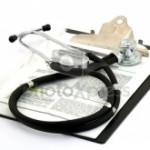 True story, with some (potentially) interesting implications –I recently spent some time in the emergency medical system, and got to see some of the benefits and foibles of electronic medical records. Some of it was great! But other parts gave me pause – I’m interested in your experiences.
True story, with some (potentially) interesting implications –I recently spent some time in the emergency medical system, and got to see some of the benefits and foibles of electronic medical records. Some of it was great! But other parts gave me pause – I’m interested in your experiences.
In December, I suffered what turned out to be a minor injury. During an exercise with one of my volunteer groups, I was doing a training exercise that involved falling and allowing the members of the group to catch you. I had not (in hindsight!) fully trained my group, and when I was falling, I ended up falling into the hands of a single individual. He did his best to catch me, but was unable to do so (not his fault!), and as I fell I struck his knee with my throat.
That blow took my breath away, and made my voice increasingly hoarse. Since I only have one airway, I thought perhaps it would be best to get it checked out to make sure it wouldn’t swell shut during the night J. My local urgent care clinic looked briefly, and immediately referred me to a nearby emergency room, as they didn’t have the tools to check it out. The emergency room (where I went post-haste) was excellent – conducted a brief triage (but got no real information from the original clinic), assigned me to a bed in the ER, got me seen by a doc pretty quickly, and then scheduled for a CT scan. There was a PC in the room that the nurses, the phlebotomist (who inserted an IV line in my hand) and others used to record what had happened with me thus far.
When the doc came through (pretty quickly, I thought), he brought a scribe with him. Turned out she was a local college student, studying to be a nurse. Her task was to enter data on my case on behalf of the doctor – a nice compromise which allowed the doctor to focus on me and my case, and not pay attention to a laptop. I suspected that it made the doc’s time much more efficient.
Then things got interesting. They took me away to run a CT scan on my throat, and brought in a throat specialist to run a scope in and look at my vocal chords (the structure most likely to have been damaged). The CT scan was delivered electronically to my records, so the throat guy could review it. He arrived very promptly (all things considered, since they brought him in from home on a Sunday night), checked things out, and prescribed a medication to be given intravenously (good thing I had that IV in already).
Some time later, the original ER doc came by to check in on me. In the pre-digital era, that would have involved him looking at my paper chart to see what had happened with all of his orders, and what the other doc had found. But not this time! Turned out that he asked me for a recap of events – had I seen the throat specialist? What did he say? What did he prescribe?
Now I suspect that if I had been unconscious or less than fully functional, he might not have used that approach. But it struck me as odd, and perhaps indicative of an issue in the ER. Perhaps the process for the ER doc to access and review records online is cumbersome? Perhaps there’s not an easy way for the doc to review patient info while retaining the efficiency he got while using his scribe to record information?
And that, of course, led to questions. What could be done differently? Is there some way, other than a laptop, that an ER doc could use to efficiently access patient information? Was he trusting my report of the information to be complete and correct, or did he go back and review the actual records later? (I assume he did, but have no way of knowing for sure.) In a more holistic way, could the original clinic have put information online in a medical record that could have been accessed by the ER doc directly, to reduce the friction in getting me into the ER system?
Have you ever experienced medical care in a digital records (paperless) environment? Have you seen anomalies that surprised you? Have you seen the benefits of those online records? I’m interested in your experiences!






